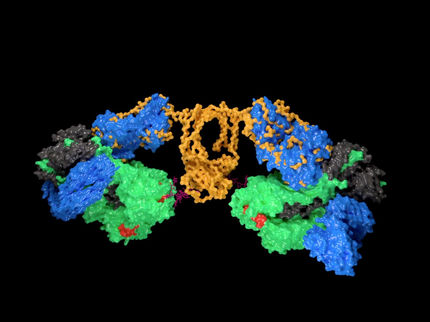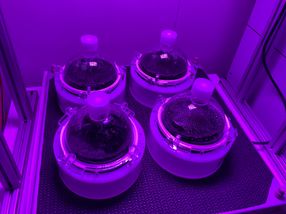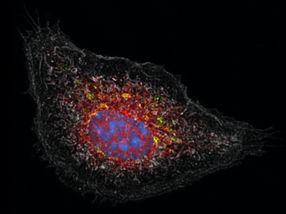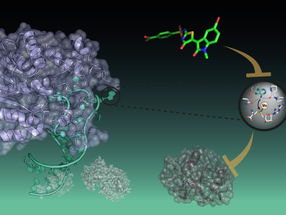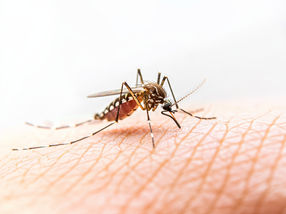Pneumonia: Treatment with Vaccines instead of Antibiotics
A properly functioning immune system is key to resolve bacterial pneumonia. Researchers from the University Children’s Hospital Zurich and UZH working with an international team have now found that specific immune cells are crucial for recovery. The researchers’ work paves the way for developing new vaccines, which would also counteract the emerging resistance to antibiotics.
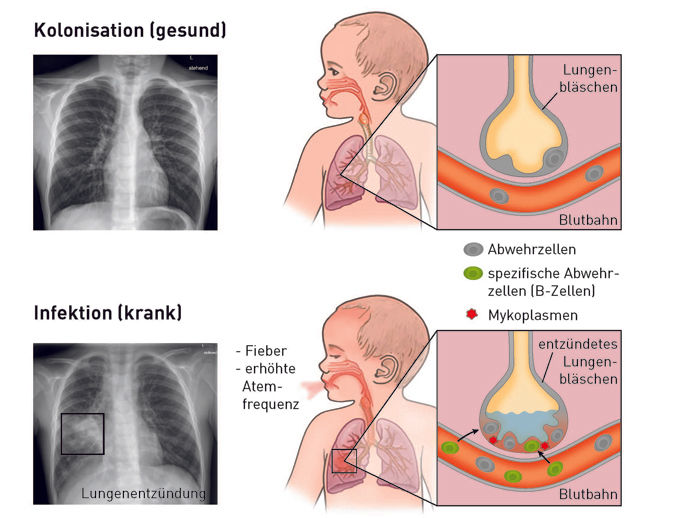
Pneumonia in the child
Susanne Staubli, Kinderspital Zürich
Mycoplasma bacteria are one of the most common causes of bacterial pneumonia in children. It is still unclear how the disease develops. Researchers from the University Children's Hospital Zurich and UZH have now demonstrated that there are specific immune cells, so-called B cells, which are crucial for recovery from the infection. The antibodies produced by these cells eliminate mycoplasma in the lungs, whereas these bacteria can persist in the upper respiratory tract. The team of researchers cultured the bacteria with a fluorescent dye and were thus for the first time able to visually track the pathogen in the lung and upper respiratory tract during an infection. The findings from the newly developed mouse model mimic clinical observations in children, whose upper respiratory tracts still contained mycoplasma following an infection.
Different immune responses in the lung and upper respiratory tract
Infectious disease specialist Patrick Meyer Sauteur showed together with the international team that there are significant differences between the lung and the upper respiratory tract in the immune response after an infection. The researchers found more so-called IgM and IgG antibodies in the lung as well as an increase and activation of B cells in local lymph nodes – which meant that pathogens were able to be eliminated within weeks. In contrast, in the upper respiratory tract they found IgA antibodies but no activation of B cells, which corresponds to the observed persistence of the pathogen at this site. In the end, experiments carried out with B cell-deficient mice demonstrated that the transfer of antibodies into these mice effectively eliminated the bacteria in the lung, but was not able to clear the bacteria in the upper respiratory tract.
B cells with crucial role
“This data is the first proof that the antibody response is crucial to clear pulmonary infections caused by mycoplasma,” states Patrick Meyer Sauteur. These findings may help develop specific vaccines that elicit antibody responses to protect from infection: “Our work paves the way for the development of vaccines against mycoplasma. Target groups for such vaccines would include young children without treatment alternatives as a result of the emerging resistance to antibiotics against mycoplasma in certain countries,” concludes Meyer Sauteur.
Original publication
Other news from the department science
Most read news
More news from our other portals
See the theme worlds for related content
Topic world Antibodies
Antibodies are specialized molecules of our immune system that can specifically recognize and neutralize pathogens or foreign substances. Antibody research in biotech and pharma has recognized this natural defense potential and is working intensively to make it therapeutically useful. From monoclonal antibodies used against cancer or autoimmune diseases to antibody-drug conjugates that specifically transport drugs to disease cells - the possibilities are enormous

Topic world Antibodies
Antibodies are specialized molecules of our immune system that can specifically recognize and neutralize pathogens or foreign substances. Antibody research in biotech and pharma has recognized this natural defense potential and is working intensively to make it therapeutically useful. From monoclonal antibodies used against cancer or autoimmune diseases to antibody-drug conjugates that specifically transport drugs to disease cells - the possibilities are enormous
